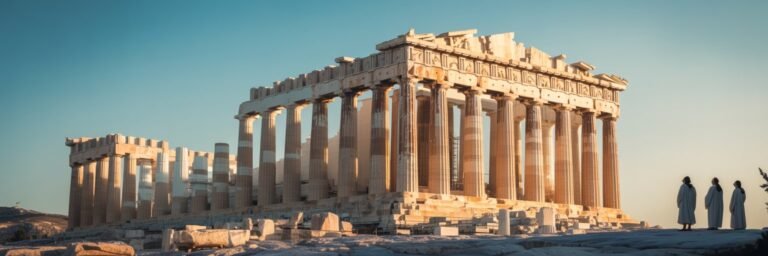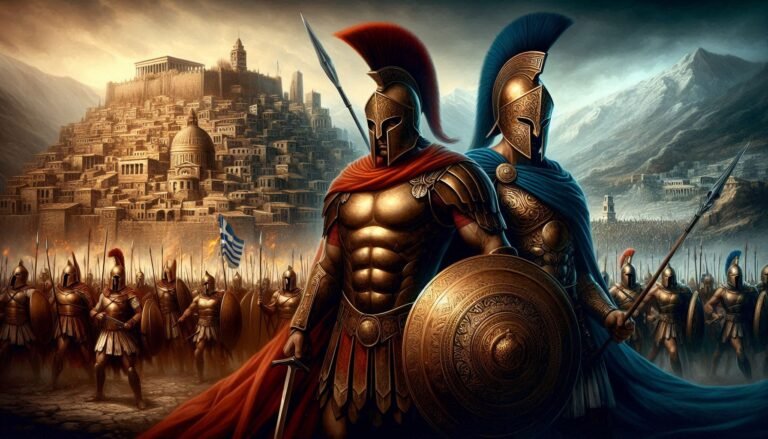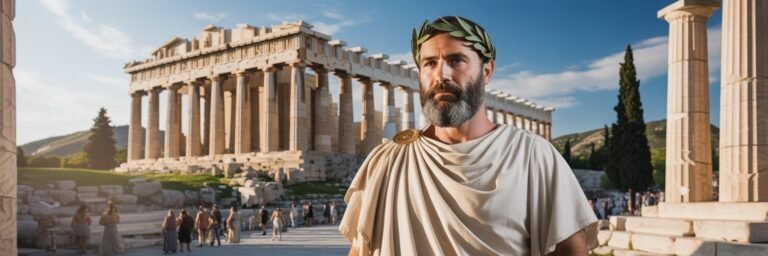For the ancient Greeks, the Gods of Olympus were far more than just deities—they were central figures in mythology, rulers of cosmic forces, and active participants in the lives of mortals. Unlike the distant, omnipotent gods of many other religions, the Greek gods were flawed, emotional, and deeply human in their desires and conflicts. Their stories shaped Greek culture, influenced political systems, and provided moral and philosophical guidance that still resonates today.
Who were these gods? What myths surrounded them? And how did their worship shape the world of ancient Greece? Let’s explore the legends of Mount Olympus, the home of the gods, and their enduring impact on Greek society.
The Twelve Olympian Gods
The Greek pantheon was led by twelve major gods, known as the Olympians, who were believed to reside atop Mount Olympus, the highest mountain in Greece. Each deity ruled over different aspects of life, nature, and human affairs.
1. Zeus – The King of the Gods
- Domain: Sky, thunder, justice
- Symbol: Thunderbolt, eagle, oak tree
- Myths: Zeus overthrew his father, Cronus, to become the supreme ruler of Olympus. He was known for his countless love affairs and his role as the enforcer of cosmic order.
- Impact: Zeus represented law, leadership, and power, reflecting the Greek values of justice and authority.
2. Hera – The Queen of the Gods
- Domain: Marriage, family, childbirth
- Symbol: Peacock, cow, pomegranate
- Myths: Hera was the wife (and sister) of Zeus, often depicted as jealous and vengeful due to Zeus’ many affairs. She played a significant role in myths like the Trojan War, where she sided against the Trojans.
- Impact: Hera’s worship emphasized the importance of marriage, loyalty, and family unity in Greek society.
3. Poseidon – God of the Sea
- Domain: Oceans, earthquakes, horses
- Symbol: Trident, dolphin, horse
- Myths: Poseidon was known for his temperamental nature, causing earthquakes and storms when angered. He played a key role in myths like Odysseus’ journey in the Odyssey, where he sought revenge against the hero.
- Impact: Greeks, as a seafaring people, prayed to Poseidon for safe voyages, and his worship was central in coastal cities.
4. Demeter – Goddess of Agriculture
- Domain: Harvest, fertility, seasons
- Symbol: Wheat, cornucopia, torch
- Myths: Her grief over the abduction of her daughter, Persephone, by Hades led to the creation of the seasons.
- Impact: The Eleusinian Mysteries, a major religious festival, honored Demeter and Persephone, celebrating themes of life, death, and rebirth.
5. Athena – Goddess of Wisdom and War
- Domain: Wisdom, strategy, civilization, war
- Symbol: Owl, olive tree, helmet
- Myths: Born from Zeus’ head, fully armored, Athena was a patron of heroes like Odysseus and Perseus.
- Impact: As the patron deity of Athens, she symbolized rational thought, strategy, and civic duty, core values in Greek society.
6. Apollo – God of the Sun, Music, and Prophecy
- Domain: Sun, music, poetry, healing, prophecy
- Symbol: Lyre, sun, laurel wreath
- Myths: Apollo’s oracle at Delphi was one of the most sacred sites in Greece, where priests interpreted divine messages.
- Impact: Apollo was linked to intellectual pursuits, the arts, and medicine, influencing philosophy and science.
7. Artemis – Goddess of the Hunt and Moon
- Domain: Wilderness, hunting, childbirth, the moon
- Symbol: Bow and arrow, deer, crescent moon
- Myths: Twin sister of Apollo, Artemis fiercely protected women and nature. She helped deliver Apollo at birth and punished those who disrespected her.
- Impact: Artemis’ cults emphasized female independence and the sacredness of nature.
8. Ares – God of War
- Domain: Violence, war, bloodshed
- Symbol: Spear, vulture, shield
- Myths: Ares was less favored than Athena, as he represented chaotic warfare rather than strategic battle.
- Impact: Unlike Athens, Sparta worshipped Ares, as their militaristic society valued brute strength.
9. Aphrodite – Goddess of Love and Beauty
- Domain: Love, beauty, desire
- Symbol: Dove, seashell, rose
- Myths: Born from sea foam, Aphrodite played a key role in the Trojan War by awarding Paris the most beautiful woman, Helen.
- Impact: Aphrodite’s cult influenced love, marriage, and fertility rituals in Greek life.
10. Hermes – Messenger of the Gods
- Domain: Communication, travel, commerce, trickery
- Symbol: Winged sandals, caduceus (staff)
- Myths: Known for his speed and cunning, Hermes guided souls to the underworld and assisted heroes like Perseus.
- Impact: He was the patron of traders and travelers, essential in a society reliant on commerce.
11. Hephaestus – God of Fire and Blacksmithing
- Domain: Fire, craftsmanship, metalwork
- Symbol: Hammer, anvil, forge
- Myths: He was the only Olympian who was physically imperfect, thrown from Olympus by Hera. He created powerful weapons, including Zeus’ thunderbolt.
- Impact: Hephaestus’ worship honored craftsmen and laborers, reinforcing the Greek respect for skilled trades.
12. Dionysus – God of Wine and Festivities
- Domain: Wine, theater, pleasure
- Symbol: Grapevine, thyrsus (staff), leopard
- Myths: His wild celebrations and cults were linked to ecstatic rituals and transformation.
- Impact: His festivals, like the Dionysia, were the foundation of Greek theater and drama.
The Influence of the Gods on Greek Society
1. Religion and Rituals
Greek religious life revolved around temples, sacrifices, and oracles. Cities built massive temples like the Parthenon in Athens, and festivals like the Olympics were held in honor of the gods.
2. Political and Social Order
Each city-state had a patron deity, reflecting its values. Athens worshipped Athena (wisdom and strategy), while Sparta revered Ares (war and strength).
3. Morality and Philosophy
Greek myths taught moral lessons about hubris (excessive pride), justice, and the consequences of defying the gods.
4. Art and Literature
The gods inspired Homer’s Iliad and Odyssey, Greek tragedies, and sculptures that remain artistic masterpieces.
Final Thoughts
The Gods of Olympus were more than myth—they were embedded in every aspect of Greek life. They shaped religious practices, governance, and cultural traditions that influenced Western civilization for centuries. Even today, their stories inspire literature, films, and philosophy, proving that the legacy of Olympus endures.





